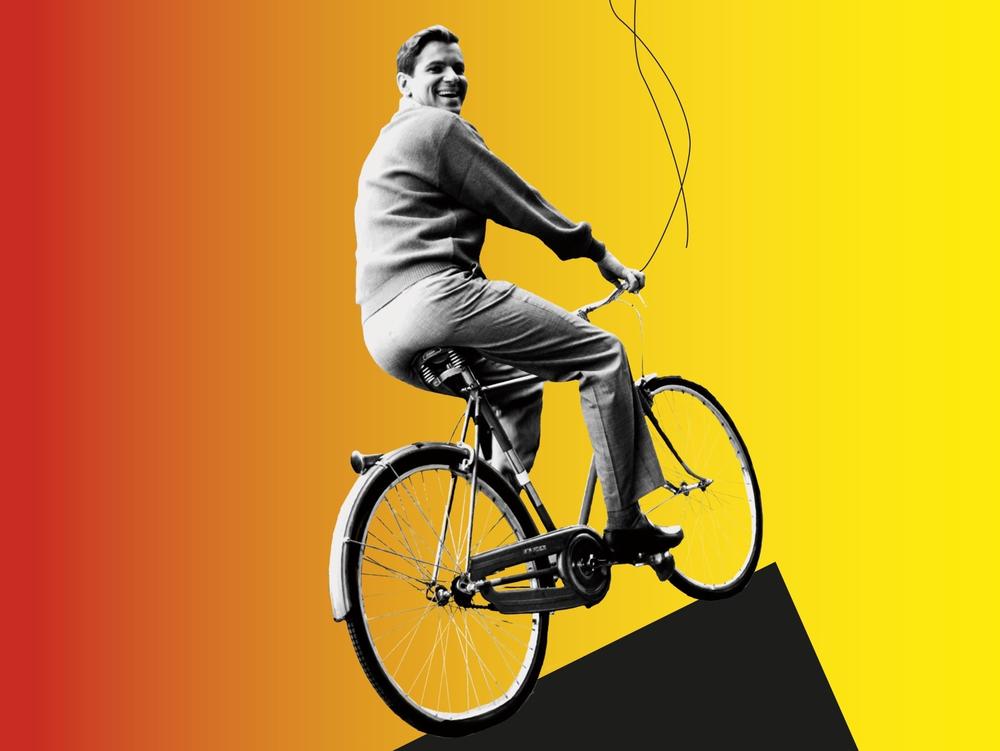Section Branding
Header Content
A showbiz striver gets one more moment in the spotlight in 'Up With the Sun'
Primary Content
Google the real-life actor, "Dick Kallman" and you'll see one of those faces that just misses. Here's how Thomas Mallon, in his dazzling new historical novel, Up With the Sun, describes the young Kallman's looks when he made his stage debut in 1951:
He had a fine, glossy New York kisser, the kind that made you wonder: Italian? Jewish? A less perfect Tony Curtis; magnetic and mischievous.
Kallman is one of two central characters in Up With the Sun. He was an actor, mostly on stage, from the early 1950s into the '70s. For a time he was even a comedy protégé of Lucille Ball's and starred for one season in the TV sitcom Hank.
"Forgettable" is an adjective that attaches itself to Kallman's career like dust to a ceiling fan; but his violent death in 1980 propelled him into a different type of fame. Kallman was shot and killed, along with his male lover, by three robbers in his Manhattan townhouse.
That townhouse doubled as a showroom for his antiques business, which he called, "Possessions of Prominence." For Mallon, that preposterously bloated name reveals something essentially off-putting about Kallman's personality. As Mallon imagines him, Kallman is just too much; too "aggressively ingratiating" with casting directors and powerful stars like Lucille Ball; too driven by an "ambition" that "stuck out like a cowlick or a horn, fatal to an audience's complete belief in almost any character he was playing." As Mallon depicts Kallman, he was his own worst enemy, much like Richard Nixon, whose psyche Mallon has also excavated in fiction.
Up With the Sun is a novel about showbiz strivers and a certain slice of gay life in mid-to-late 20th-century America. Mallon's other main character here is his sometime narrator, a wry and sweet gay man named Matt Liannetto, who's a musical accompanist on several of the shows Kallman appears in.
In Mallon's imagining, Matt visits Kallman on the evening of his death; curiously, the stingy Kallman gives Matt a piece of costume jewelry, which turns out to be, in Alfred Hitchcock's famous term, the "McGuffin" that holds the secret to the motive for Kallman's murder.
Throughout his writing career, Mallon has perfected the art of immersing readers in times past without making us feel like we're strolling through a simulacrum like Disneyland's Main Street, U.S.A. Unlike his anti-hero Kallman, Mallon never lays it on too thick. For instance, Mallon has an expert's fine appreciation for the mundane language of the period: he has Kallman exclaim at one point, "How about that!" (When was the last time you heard anyone utter that old phrase?)
The celebrities who populate this novel are mostly bygone B-listers like Kaye Ballard and Dolores Gray, as well as the beloved old Turner Movie Classics host, Robert Osborne. Lest the atmosphere get too nostalgic, too maudlin, Mallon's signature wit remains crisp as a kettle chip. He clearly has a blast, for example, making up a bad newspaper review of Kallman's overacting, in which the fictional critic comments: "Mr. Kallman probably puts sugar in his saccharine." Good line.
Mallon's best historical novels — and this is one of them — are haunted by a sharp awareness of the transiency of things. So it is that fame and the magic of even the greatest of performances, such as Judy Garland's 1961 comeback show at Carnegie Hall, are only momentary. Kallman is in the audience at that show, along with fading Hollywood stars and about a thousand teary-eyed gay men. The also gay-but-disdainfully-dry-eyed Kallman thinks to himself that: "Whatever was broken in these guys, was reaching toward and sparking whatever was broken in her."
Time moves on and Judy and her fans vanish; whole worlds are wiped away. This sweeping novel takes readers up to the early days of the AIDS epidemic; an epidemic Mallon himself lived through. A couple of months ago, The New Yorker published excerpts of the diaries a young Mallon kept while he was living in New York as the "gay cancer" was ravaging that city. Those diary entries are immediate and devastating — as well as, improbably and mercifully, witty. As Up With the Sun nears its end, we readers realize AIDS is waiting in the wings, which makes the time we spend — even with the entertaining, yet obnoxious likes of Mallon's Dick Kallman — all the more precious.
Copyright 2023 Fresh Air. To see more, visit Fresh Air.

